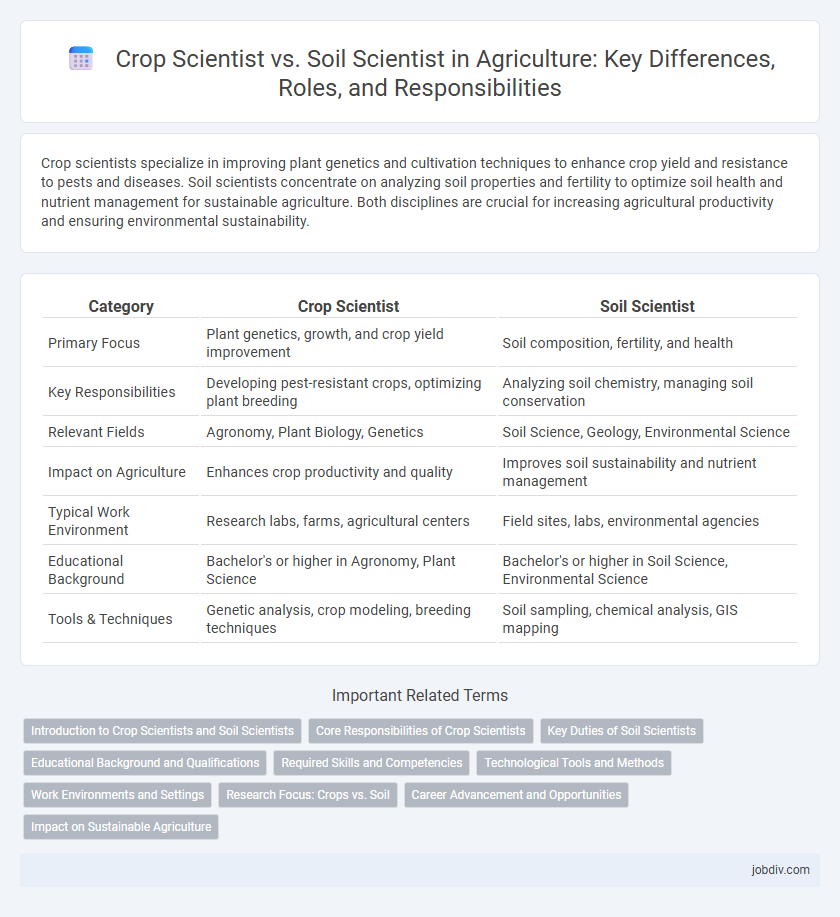Crop scientists specialize in improving plant genetics and cultivation techniques to enhance crop yield and resistance to pests and diseases. Soil scientists concentrate on analyzing soil properties and fertility to optimize soil health and nutrient management for sustainable agriculture. Both disciplines are crucial for increasing agricultural productivity and ensuring environmental sustainability.
Table of Comparison
| Category | Crop Scientist | Soil Scientist |
|---|---|---|
| Primary Focus | Plant genetics, growth, and crop yield improvement | Soil composition, fertility, and health |
| Key Responsibilities | Developing pest-resistant crops, optimizing plant breeding | Analyzing soil chemistry, managing soil conservation |
| Relevant Fields | Agronomy, Plant Biology, Genetics | Soil Science, Geology, Environmental Science |
| Impact on Agriculture | Enhances crop productivity and quality | Improves soil sustainability and nutrient management |
| Typical Work Environment | Research labs, farms, agricultural centers | Field sites, labs, environmental agencies |
| Educational Background | Bachelor's or higher in Agronomy, Plant Science | Bachelor's or higher in Soil Science, Environmental Science |
| Tools & Techniques | Genetic analysis, crop modeling, breeding techniques | Soil sampling, chemical analysis, GIS mapping |
Introduction to Crop Scientists and Soil Scientists
Crop scientists specialize in improving plant varieties through genetics, breeding, and pest management to enhance yield, quality, and resistance to diseases. Soil scientists focus on analyzing soil properties, fertility, and erosion to optimize land use and promote sustainable farming practices. Both disciplines collaborate to increase agricultural productivity while maintaining environmental health.
Core Responsibilities of Crop Scientists
Crop scientists specialize in improving crop yield, quality, and resistance to pests and diseases through genetic research and field trials. They conduct experiments on plant breeding, nutrient management, and environmental stress tolerance to enhance agricultural productivity. Their core responsibilities include developing sustainable crop production techniques and collaborating with farmers to implement best practices.
Key Duties of Soil Scientists
Soil scientists analyze soil composition, fertility, and structure to recommend optimal land management practices that enhance crop production and environmental sustainability. They conduct soil sampling, classify soil types, and assess nutrient availability to support plant growth and prevent degradation. Their expertise is crucial for developing soil conservation strategies and advising on irrigation, fertilization, and land-use planning.
Educational Background and Qualifications
Crop scientists typically hold a bachelor's or advanced degree in agronomy, plant science, or agricultural science, emphasizing plant genetics, breeding, and pathology. Soil scientists usually pursue degrees in soil science, geology, or environmental science, concentrating on soil composition, classification, and fertility management. Both careers often require research experience, proficiency in laboratory techniques, and knowledge of environmental regulations.
Required Skills and Competencies
Crop scientists require in-depth knowledge of plant biology, genetics, and pest management to improve crop yields and resistance. Soil scientists must possess expertise in soil chemistry, nutrient management, and environmental impact assessment to maintain soil health and sustainability. Both roles demand strong analytical skills, proficiency in data interpretation, and experience with agricultural technology and field research.
Technological Tools and Methods
Crop scientists utilize advanced technologies such as remote sensing, genetic engineering, and precision agriculture tools to enhance crop yield and resistance. Soil scientists employ GIS mapping, soil spectroscopy, and automated sensors to analyze soil health and nutrient composition for sustainable land management. Both disciplines integrate data analytics and modeling software to optimize agricultural productivity through informed decision-making.
Work Environments and Settings
Crop scientists predominantly work in agricultural research centers, greenhouses, and field stations, conducting experiments to improve crop yield and resistance. Soil scientists are commonly found in laboratories, soil testing facilities, and outdoor sites, analyzing soil composition and health to support sustainable land management. Both roles often collaborate in universities and government agencies focused on agricultural development and environmental conservation.
Research Focus: Crops vs. Soil
Crop scientists specialize in researching plant genetics, growth patterns, and pest resistance to improve crop yield and quality, while soil scientists focus on analyzing soil composition, fertility, and erosion to enhance soil health and sustainable land use. Both fields employ advanced techniques such as remote sensing and laboratory analysis but differ fundamentally in their primary subjects of study--plants versus soil ecosystems. Integrating insights from both disciplines leads to optimized agricultural productivity and environmental conservation.
Career Advancement and Opportunities
Crop scientists specialize in improving plant growth and productivity through genetics and pest management, offering career advancement in agricultural biotechnology and crop improvement research. Soil scientists focus on soil health, fertility, and conservation, with opportunities in environmental consulting, land management, and sustainable agriculture practices. Both careers provide paths in academia, government agencies, and private sector roles, emphasizing interdisciplinary collaboration and innovation.
Impact on Sustainable Agriculture
Crop scientists develop disease-resistant and high-yielding plant varieties that enhance food security and reduce the need for chemical inputs, directly supporting sustainable agriculture. Soil scientists analyze soil health, nutrient cycling, and erosion control, ensuring the foundation for productive and resilient farming systems. Both roles synergize by promoting resource-efficient practices that maintain ecosystem balance and long-term agricultural productivity.
Crop Scientist vs Soil Scientist Infographic

 jobdiv.com
jobdiv.com